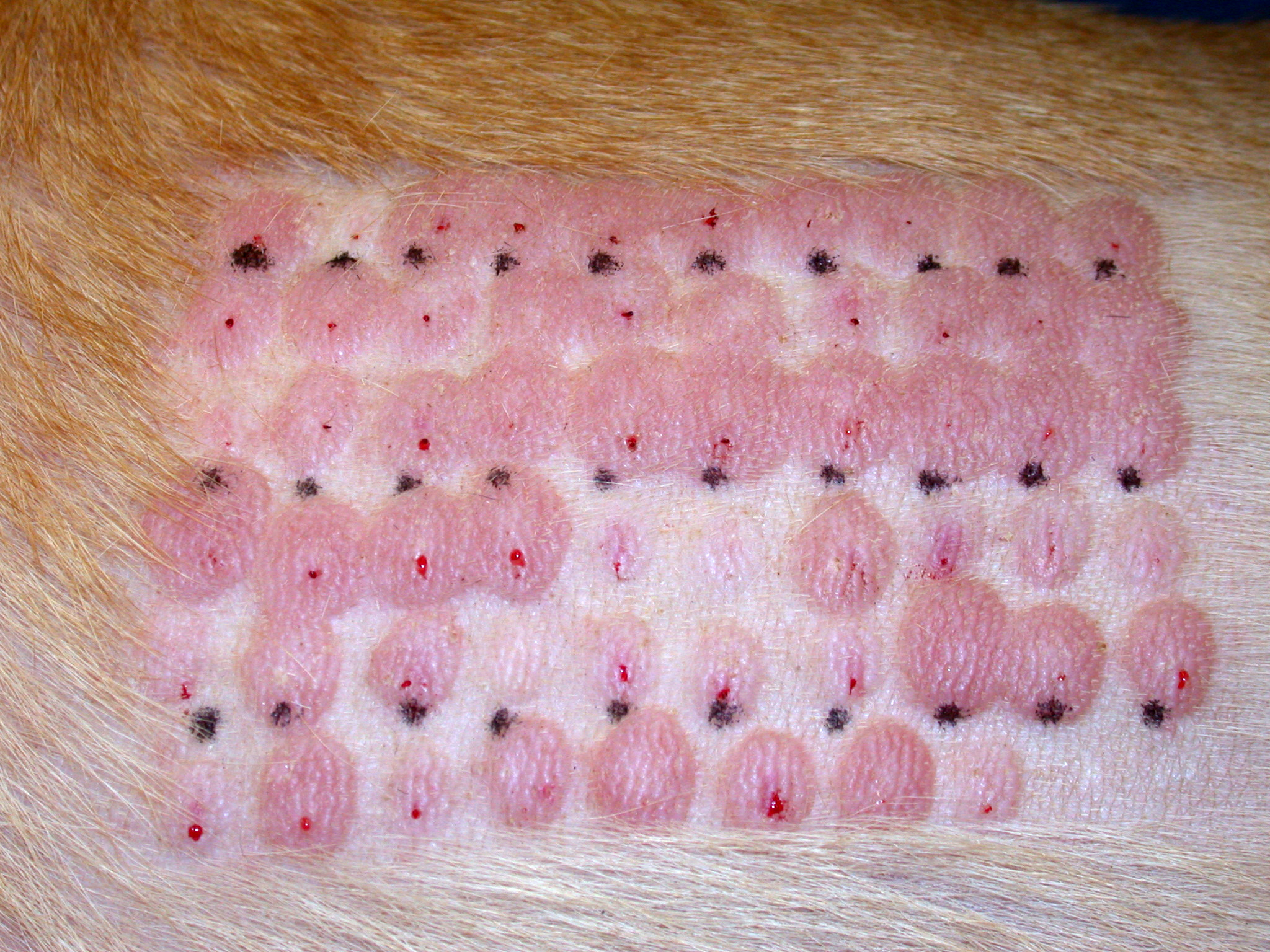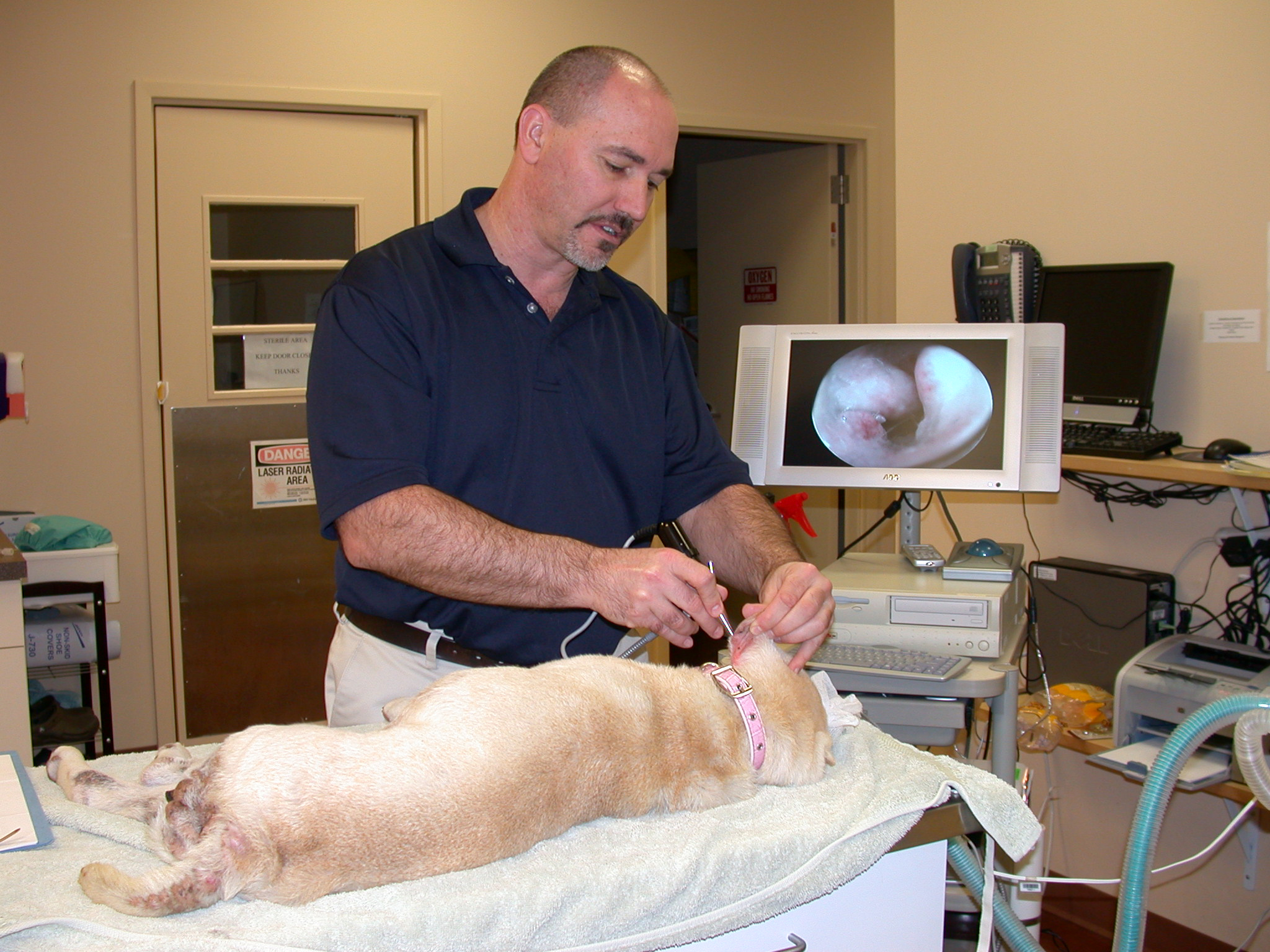
Intradermal skin testing
Intradermal allergy testing (skin testing) is the gold standard of allergy testing for pollen/environmental allergies (atopy). The procedure is very similar to allergy testing in humans. Small amounts of individual, local allergens are injected into the skin in a grid-pattern and then observed for reaction. Hive reactions to individual allergens will typically occur within 10-15 minutes and those results are recorded. This way, we have the allergy test results the same day the test was performed. In order to minimize stress to your pet, a light, reversible sedative is administered prior to testing. We are able to do allergy skin testing in dogs, cats, and horses. Once the results of the allergy test have been recorded, we use the positive reactions to develop an immunotherapy to treat your pet’s allergies. The immunotherapy is specific to each individual pet and is the safest long-term treatment for this type of allergy. Traditionally, allergy immunotherapy has been administered by injections under the skin, and most owners feel comfortable learning to do the injections themselves. Recently, we’ve started offering sublingual immunotherapy where the treatment is simply squirted under the tongue. In either instance, we expect to see a gradual reduction in allergic symptoms in about 70-75% of the patients.
In order to be allergy skin tested, certain medications need to be withdrawn from the patient (see table below). However, we can often find symptomatic treatments to keep your pet comfortable until testing can be done.
Medical Management of Recurrent Ear Infections
Recurrent ear infections (otitis) are common in the dog, and may occasionally occur in the cat. Recurrent otitis can cause a tremendous amount of discomfort for our veterinary patients. Early, aggressive medical management of recurrent otitis can help to avoid the need for surgical intervention later in life. Southeast Veterinary Dermatology & Ear clinic utilizes video-otoscopy as part of this medical management plan. Video otoscopy allows enhanced imaging of the affected ears by using a small camera that is placed into the ear canal. This image is then seen on a larger screen. Enhanced visualization of the ear canals and affected tissue assists in treatment of infections, evaluation of the tympanic membrane (ear drum), and may allow early detection of tumors or other anatomical causes of recurrent ear infections.

Diagnosis and Management of Autoimmune Skin Disease
There are a number of autoimmune diseases in the dog and cat. Accurate diagnosis of these conditions allows for the formulation of an effective management plan. Most autoimmune diseases require life-long therapy, so finding the safest, long-term therapy is essential to maintaining a good quality of life for the patient. These are examples of some of the disorders that may be addressed by a veterinary dermatologist. However, our doctors focus on the diagnosis and management of any diseases of the skin, ears and claws.
Other Skin Diseases
- Recurrent bacterial infections of the skin
- Parasitic infestations of the skin and ears
- Fungal infections of the skin, ears, and claws
- Diagnosis and management of some skin cancers
Medicines to Withhold
Before Allergy Testing
Those patients being referred specifically for intradermal skin testing will need to have the following medications withdrawn prior to testing:
• Oral corticosteroids (Prednisone):4 weeks
• Short-acting injectable corticosteroids (Dexamethasone, Vetalog) : 4-6 weeks
• Long-acting injectable corticosteroids (Depo-medrol) : 8-12 weeks
• Topical corticosteroids (including ear medications like Otomax) : 4 weeks
• Antihistamines (Benadryl, Zyrtec, Hydroxizine, etc.) : 2 weeks
• Amitriptylline (Elavil) : 2 Weeks
• Oral progestins (Ovaban, etc.) : 4 weeks
• Intact female dogs must be out of heat for at least 4 weeks before allergy testing can be performed.
